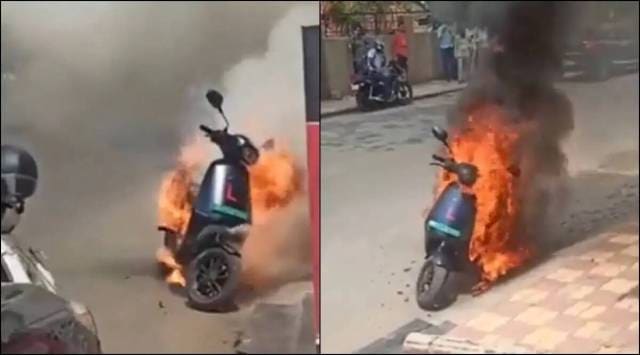- India
- International
To rev up EV push, battery solutions per Indian needs
NITI Aayog, DST meet battery makers, academia amid incidents of electric two-wheeler fires; govt, industry plan open source battery management system
 The Sunday Express has learnt that the NITI Aayog and DST are collaborating with policy think tank WRI India to carry out discussions with the industry. Twitter
The Sunday Express has learnt that the NITI Aayog and DST are collaborating with policy think tank WRI India to carry out discussions with the industry. TwitterGovernment think tank NITI Aayog and the Department of Science & Technology (DST) have kicked off deliberations with the industry and academia on developing an open source battery management system (BMS) for two- and three-wheeler EVs.
While the idea to develop an open source BMS was first floated last year, it has caught renewed momentum in the wake of several recent instances of two-wheeler electric vehicles (EVs) catching fire, according to a senior government official.
The Sunday Express has learnt that the NITI Aayog and DST are collaborating with policy think tank WRI India to carry out discussions with the industry.
The organisations have so far held at least two meetings with representatives of battery manufacturing companies and academia on developing a BMS solution tailored for Indian conditions, people in the know said. The following meetings will also involve representatives of EV manufacturers, it is learnt.
EVs are primarily powered by a battery pack consisting of Lithium-ion (Li-ion) cells, and a BMS is applied to the battery pack to make sure it operates safely. In simple terms, a BMS is essentially an electronic system that is connected to all the cells in a Li-ion battery pack, which constantly measures the voltage and current flowing through it.

For safer, cost-effective EV ecosystem
A battery management system (BMS) is an electronic system that is connected to all the cells in a Li-ion battery pack, which constantly measures the voltage and current flowing through it. It is considered to be a crucial part of ensuring safety — a BMS also comes equipped with a myriad of temperature sensors, providing it information on temperatures at different sections of the battery pack. As per sources, many Indian two- and three-wheeler EV companies import batteries and some other critical components of EVs, which may not be suitable for Indian conditions by virtue of not having undergone rigorous testing. The NITI Aayog and the Department of Science & Technology want to come up with a low-cost open source BMS solution suited to Indian conditions. By virtue of being open source, the solution can be customised by the likes of researchers and industry players while largely remaining cost effective.
A BMS is also equipped with a myriad of temperature sensors, providing it information on temperatures at different sections of the battery pack. All this data helps the BMS calculate other parameters of a battery pack, like the charging and discharging rate, battery life cycle and efficiency. An open source BMS would mean that the solution can be customised by different entities as per their manufacturing requirements.
Sources said that the idea behind building an open source BMS solution is that it can be improved by researchers and the industry, while remaining cost effective at the same time.
🚨 Limited Time Offer | Express Premium with ad-lite for just Rs 2/ day 👉🏽 Click here to subscribe 🚨
According to a source aware of details about the project, “Currently, India is importing EV batteries and some of the other critical components of EVs. In the recent past, concerns have been raised due to fire accidents. With growing EV penetration, it is very important to develop a BMS suitable for the Indian operating conditions.”
Two- and three-wheelers are the highest selling EVs in India. According to the Federation of Automobile Dealers Association (FADA), in 2021-22, over four lakh EVs were sold in the country, of which two-wheelers accounted for more than two lakh and three-wheelers accounted for over one lakh units
“Two- and three-wheel EVs are responsible for a majority of all EV sales in the country. But cost is a big factor in these vehicles. We want to develop an open source BMS solution so that manufacturers can integrate it while keeping costs in check. Right now, the only large-scale open source BMS is from the Germany-based Fraunhofer Society, but that solution is targetted towards electric cars and buses. NITI Aayog and DST’s will be the first open source BMS designed specifically for two- and three-wheelers,” the source said.
For safer, cost-effective EV ecosystem
A battery management system (BMS) is an electronic system that is connected to all the cells in a Li-ion battery pack, which constantly measures the voltage and current flowing through it. It is considered to be a crucial part of ensuring safety — a BMS also comes equipped with a myriad of temperature sensors, providing it information on temperatures at different sections of the battery pack. As per sources, many Indian two- and three-wheeler EV companies import batteries and some other critical components of EVs, which may not be suitable for Indian conditions by virtue of not having undergone rigorous testing. The NITI Aayog and the Department of Science & Technology want to come up with a low-cost open source BMS solution suited to Indian conditions. By virtue of being open source, the solution can be customised by the likes of researchers and industry players while largely remaining cost effective.
The project, it is learnt, is planned to be carried out in two phases. In the first phase, a basic BMS combining both hardware and software will be developed which could be used by the industry to use or customise. In the next phase, certain advanced features will be added to the BMS to grow a circular economy strategy for EV batteries.
“For example, the collection of critical data with the help of BMS, and its analysis can help in better decisions about the reuse or recycling of EV batteries,” an official said. Queries sent to the NITI Aayog and DST remained unanswered until publication.
The development comes at a time when dozens of electric two-wheelers have caught fire over the last few months, claiming at least four lives.
The incidents had prompted the Road Transport Ministry to rope in the Centre for Fire Explosive and Environment Safety (CFEES) to investigate these incidents and suggest remedial measures.
In April, Road Transport and Highways Minister Nitin Gadkari cautioned EV manufacturers, asking them to take “advance action” in recalling all defective batches of vehicles immediately and said the government would soon issue quality-centric guidelines for electric vehicles.
Apr 25: Latest News
- 01
- 02
- 03
- 04
- 05








































